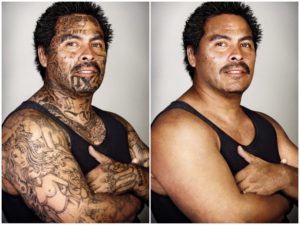 Skin Deep: Looking Beyond the Tattoos is a book you absorb through your eyes and into your heart. This 176-page coffee table book is a thoughtful catalog of stunning photographs of formerly incarcerated people and their self-disclosures about their tattoos. Twenty-seven people are presented in two striking visuals: heavily tattooed and digitally retouched without their prison ink. Author Steven Burton, a British self-taught photographer, combines his love of photography with a passion for portraiture in this two-year project.
Skin Deep: Looking Beyond the Tattoos is a book you absorb through your eyes and into your heart. This 176-page coffee table book is a thoughtful catalog of stunning photographs of formerly incarcerated people and their self-disclosures about their tattoos. Twenty-seven people are presented in two striking visuals: heavily tattooed and digitally retouched without their prison ink. Author Steven Burton, a British self-taught photographer, combines his love of photography with a passion for portraiture in this two-year project.
Burton’s provocative photo magic is coupled with his subjects’ reactions to juxtaposed photos of themselves. Burton creates a platform for these people to express their feelings about themselves, for their families’ reactions, and most intriguingly, for them to see how their perspectives on their tattoos have changed (or not). This creative setup evokes insightful first-person narratives from the interviewees.
When David sees his comparison studies, his initial reaction is shock. “Damn, this is what I could have looked like! Damn, this is crazy! And in discussing how he’d explain his tattoos to his young son, he says, “I don’t know the kind of conversation we will have. I will just try to teach him from young that this shit is bad.”
Most of the twenty-seven people reach conclusions much like David’s, citing regrets over their inked prison camouflages. Some have profound realizations about their impulsive peer-pressure inking. They speak of encountering immediate negative judgment from society—including relatives, potential employers, and the police. Probable cause for a police stop can simply, though not necessarily legally, be tattoos (especially on the face and neck) that broadcast that a person has done prison time.
However, not all have regrets. Francisco’s perception of his two pictures show a man with a subjective rationale for preferring his tattooed body. “I define myself by the way I carry myself and my actions, not by my tattoos. They are just a part of me, you know what I mean? . . . We are not trying to harm anyone, it’s just the lifestyle we chose. We tattoo our neighborhoods on ourselves just to represent [ourselves], not to scare anybody off. Let everybody know where we are from.”
The backstory to how Burton had access to his subjects is worth noting. He dedicates the book to American Jesuit priest Greg Boyle, S. J., the founder and executive director of Homeboy Industries in Los Angeles. The mission of Homeboy Industries is to provide “hope, training, and support to formerly gang-involved and previously incarcerated men and women allowing them to redirect their lives and become contributing members of our [the Los Angeles] community.”
In Skin Deep’s foreword, Father Boyle reveals the genesis of Homeboys’ tattoo removal program. A man who had just been released from prison walked into his office. Tattooed across his entire forehead like a billboard, Boyle recalls, was “FUCK THE WORLD.” Boyle continues, “He looks at me and says, ‘You know, I’m having a hard time finding a job.’ I suggested that perhaps he and I could ‘put our heads together on this one.’ Our tattoo removal program was born that day.”
Tattoos Revisited
In my December 2016 post entitled Et Tu Tattoo, I wrote about Steven Burton’s original work in his yet-to-be published book that was later released in October 2017. That post focuses on the reactions viewers have when seeing and encountering highly tattooed people. There’s a visceral response that’s mostly negative. When I was in prison, my first reaction to seeing a man with ink all over his face and neck was fear. I felt nauseated. I got over those feelings when I began interacting with these guys.
Now that I have read Skin Deep with its insightful interviews and viewed the pictures, I see, once more, the human side of highly inked people. I feel more objective and less judgmental—much the same as I felt when I was in prison with inmates who presented like a David or Francisco. They were just people, and this book reminded me of that fact all over again.
Burton’s expressed goal for writing this book works for me. He writes in the introduction: “I hope this book will enable people to look beyond tattoos and see those who are so often misunderstood and demonized by society in a new light.”
I recommend reading this book. It is moving and sensitizing—what you see is not always what you get in a person. Knowing what’s going on in the minds of people whose physical presence may scare us can be revealing about ourselves. This book lets us enter an ostensibly frightening world without danger and, hopefully, with enlightenment. Skin Deep goes much deeper than its title.
- To watch some of the interviewees’ reactions to their photos, click here.
- To learn more about Steven Burton’s work, click here.
I’m looking forward to reading your comments.
Photos by Steven Burton, used with permission